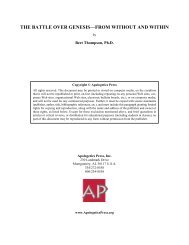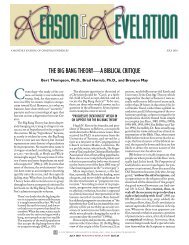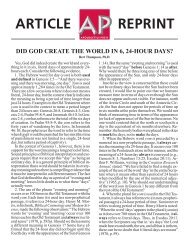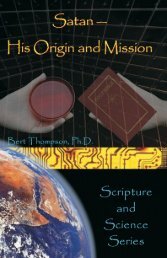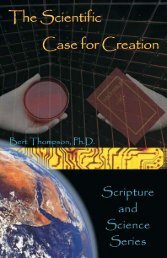Will Those Who have Never Heard the Gospel ... - Apologetics Press
Will Those Who have Never Heard the Gospel ... - Apologetics Press
Will Those Who have Never Heard the Gospel ... - Apologetics Press
- No tags were found...
You also want an ePaper? Increase the reach of your titles
YUMPU automatically turns print PDFs into web optimized ePapers that Google loves.
Lesson 9<strong>Will</strong> <strong>Those</strong> <strong>Who</strong> <strong>have</strong> <strong>Never</strong> <strong>Heard</strong> <strong>the</strong> <strong>Gospel</strong> be Lost?<strong>Apologetics</strong> <strong>Press</strong> Advanced Christian Evidences Correspondence Course
WILL THOSE WHO HAVE NEVERHEARD THE GOSPEL BE LOST?Not many people on <strong>the</strong> planet receive as much sympathy as <strong>the</strong> nativesin <strong>the</strong> African wilderness. Each and every time we consider <strong>the</strong> ultimate fateof <strong>the</strong>se people who <strong>have</strong> not obeyed <strong>the</strong> <strong>Gospel</strong>, sympathy is poured outfor such individuals who are isolated from <strong>the</strong> world and, as such, probably<strong>have</strong> never heard <strong>the</strong> <strong>Gospel</strong>. “How could God condemn people who neverhad <strong>the</strong> opportunity to hear <strong>the</strong> <strong>Gospel</strong>?” <strong>the</strong> argument goes. So what, exactly,does <strong>the</strong> Bible <strong>have</strong> to say about those who <strong>have</strong> never heard <strong>the</strong> <strong>Gospel</strong>—whe<strong>the</strong>rit be an African natives or your next door neighbor?We live on a planet populated by approximately six billion people. Six billion!And most of those, it probably would be safe to say, never <strong>have</strong> beenafforded <strong>the</strong> opportunity of hearing <strong>the</strong> <strong>Gospel</strong> message about <strong>the</strong> salvationthat comes through Jesus Christ. Therefore, obviously, <strong>the</strong>y cannot respondin obedience to that saving message—even though <strong>the</strong>y might be willing todo so if presented with <strong>the</strong> prospect. What will happen to <strong>the</strong>se people? <strong>Will</strong><strong>the</strong>y be lost? Or will God make some kind of “special allowance” so that <strong>the</strong>ycan be saved and <strong>the</strong>reby enjoy eternity in heaven with Him and His Son?As we examine <strong>the</strong>se kinds of questions, it is vitally important that we remembertwo points. First, “<strong>the</strong> Judge of all <strong>the</strong> Earth” will “do right” (Genesis18:25). God is every bit as infinite in His mercy and His grace (Hosea 6:6;Mat<strong>the</strong>w 9:13) as He is in His justice and His severity (Hebrews 10:31). Second,since it is <strong>the</strong> Word of God that instructs us regarding man’s eternal destiny,and since all men eventually will be judged by that Word (John 12:48),it is to God’s Word that we must go to find answers to inquiries concerningmankind’s ultimate destiny. Fortunately, in His wisdom, God has not left us toour own devices concerning matters that relate to our salvation. As Jeremiahwisely observed: “It is not in man that walketh to direct his steps” (10:23).There are those who suggest that surely God would not banish from Hispresence for eternity those who never had an opportunity to hear and obey<strong>the</strong> <strong>Gospel</strong> message in <strong>the</strong> first place. Consider <strong>the</strong> following examples. In his1909 volume, Systematic Theology, A.H. Strong wrote:Since Christ is <strong>the</strong> Word of God and <strong>the</strong> Truth of God, he may be receivedeven by those who <strong>have</strong> not heard of his manifestation in <strong>the</strong>flesh.... We <strong>have</strong>, <strong>the</strong>refore, <strong>the</strong> hope that even among <strong>the</strong> hea<strong>the</strong>n<strong>the</strong>re may be some...who under <strong>the</strong> guidance of <strong>the</strong> Holy Spiritworking through <strong>the</strong> truth of nature and conscience, <strong>have</strong> found<strong>the</strong> way to life and salvation (p. 843, emp. added).1
Ano<strong>the</strong>r modern-day evangelical, Neil Punt, invoked similar ideas in hisbook, Unconditional Good News, wherein he rejected <strong>the</strong> idea that sinnersactually must believe and obey <strong>the</strong> gospel in order to be saved because “It isan error to think that <strong>the</strong>re is anything that must be done to inherit eternallife” (1980, p. 135, emp. added). In What <strong>the</strong> Bible Says about Salvation,VirgilWarren wrote: “Our opinion is that scripture does not automatically assign<strong>the</strong> unevangelized to endless hell” (1982, pp. 105, emp. added). In <strong>the</strong>irbook, Answers to Tough Questions, Josh McDowell and Don Stewart stated:Although <strong>the</strong> Scriptures never explicitly teach that someone who hasnever heard of Jesus can be saved, we do not believe that it infers [sic]this. We do believe that every person will <strong>have</strong> an opportunity to repent,and that God will not exclude anyone because he happened tobe born at <strong>the</strong> wrong place and at <strong>the</strong> wrong time (1993, p. 137).Statements such as <strong>the</strong>se certainly could cause some to conclude that Godsimply will not judge <strong>the</strong> lost, but instead will deem <strong>the</strong>m worthy of eternalsalvation merely (or solely!) because <strong>the</strong>y never had an opportunity in <strong>the</strong>irlifetimes to hear <strong>the</strong> “good news” made available to humankind through <strong>the</strong><strong>Gospel</strong> of Christ. While at first glance such a notion may appear comforting,and may appease our human sensitivities, <strong>the</strong> truth of <strong>the</strong> matter is that it hasmonstrous <strong>the</strong>ological and spiritual implications. Consider <strong>the</strong>se facts.First—in light of <strong>the</strong> commands inherent in <strong>the</strong> Great Commission givenby <strong>the</strong> Lord Himself prior to His ascension back into heaven—how can weentertain any suggestion that <strong>the</strong> “unevangelized” will be saved? Christ’s instructionswere crystal clear: “Go ye <strong>the</strong>refore, and make disciples of all<strong>the</strong> nations, baptizing <strong>the</strong>m into <strong>the</strong> name of <strong>the</strong> Fa<strong>the</strong>r and of <strong>the</strong> Son andof <strong>the</strong> Holy Spirit: teaching <strong>the</strong>m to observe all things whatsoever I commandedyou...” (Mat<strong>the</strong>w 28:19-20). If <strong>the</strong> view is correct that <strong>the</strong> unevangelizedpeoples of <strong>the</strong> world will be redeemed without ever having been exposedto (and obeying) <strong>the</strong> <strong>Gospel</strong>, <strong>the</strong>n potentially we could be doing <strong>the</strong>mgreat harm if we carry out <strong>the</strong> Lord’s command and teach <strong>the</strong>m <strong>the</strong> Truth. Byintroducing <strong>the</strong>m to <strong>the</strong> <strong>Gospel</strong>, we might well be condemning those who o<strong>the</strong>rwisewould <strong>have</strong> been saved. When R.C. Sproul wrote his book, Reasonto Believe, he expended considerable effort in explaining why such a positionis unscriptural. He prefaced his discussion with <strong>the</strong> following statements:The unspoken assumption at this point is that <strong>the</strong> only damnable offenseagainst God is <strong>the</strong> rejection of Christ. Since <strong>the</strong> native is notguilty of this, we ought to let him alone. In fact, letting him alone wouldbe <strong>the</strong> most helpful thing we could do for him. If we go to <strong>the</strong> nativeand inform him of Christ, we place his soul in eternal jeopardy. Fornow he knows of Christ, and if he refuses to respond to Him, he can nolonger claim ignorance as an excuse. Hence, <strong>the</strong> best service we canrender is silence (1981, p. 50).2
Ponder <strong>the</strong> situation of a person who never has <strong>the</strong> opportunity to hear<strong>the</strong> <strong>Gospel</strong>. If <strong>the</strong> ideas expressed in some of <strong>the</strong> above quotations are correct,<strong>the</strong>n that person will be saved necessarily. But what about <strong>the</strong> personto whom we present <strong>the</strong> <strong>Gospel</strong> message, and who <strong>the</strong>n, of his or her ownpersonal volition, chooses (for whatever reason) to reject it? Having spurnedGod’s offer of salvation through His Son, can such a one <strong>the</strong>n be saved? Notaccording to God’s Word!The writer of <strong>the</strong> book of Hebrews noted: “For if we sin wilfully after thatwe <strong>have</strong> received <strong>the</strong> knowledge of <strong>the</strong> truth, <strong>the</strong>re remaineth no more a sacrificefor sins” (10:26). In Luke 13:34-35, Christ Himself lamented <strong>the</strong> rejectionof <strong>the</strong> <strong>Gospel</strong> message by His own Jewish brethren (who had been presentedwith <strong>the</strong> <strong>Gospel</strong>, but had rebuffed it repeatedly).Oh Jerusalem, Jerusalem,...how often would I <strong>have</strong> ga<strong>the</strong>red thy childrentoge<strong>the</strong>r,evenasahenga<strong>the</strong>rethherownbroodunderherwings,and ye would not! Behold, your house is left unto you desolate:and I say unto you, Ye shall not see me, until ye shall say, “Blessed ishe that cometh in <strong>the</strong> name of <strong>the</strong> Lord”(emp. added).Consider, too, <strong>the</strong> important spiritual principle set forth in Hebrews 6:4-6,which, although admittedly speaking about people who once had acceptedChrist as <strong>the</strong>ir Savior and <strong>the</strong>n had abandoned <strong>the</strong>ir faith in Him, never<strong>the</strong>lessmentions those who at one time were “enlightened” about <strong>Who</strong> He wasand <strong>the</strong> salvation He offered—only to reject both Him and that salvation.Would it not, <strong>the</strong>n (if <strong>the</strong> views discussed above are correct), be better simplyto keep <strong>the</strong> Word of God “a secret” from <strong>the</strong> hea<strong>the</strong>n and <strong>the</strong> unevangelizedso that <strong>the</strong>y—as a result of <strong>the</strong>ir ignorance—can be saved and not be put in <strong>the</strong>position of knowing <strong>the</strong> <strong>Gospel</strong> message and possibly rejecting it? In <strong>the</strong>irbook, I’m Glad You Asked, Kenneth Boa and Larry Moody observed:<strong>Those</strong> who <strong>have</strong> heard <strong>the</strong> <strong>Gospel</strong> and rejected it are doubly guilty—<strong>the</strong>y <strong>have</strong> rejected not only <strong>the</strong> Fa<strong>the</strong>r but also <strong>the</strong> Son. And <strong>the</strong> Scripturesare clear about <strong>the</strong> judgment which awaits those who <strong>have</strong> refusedGod’s offer of salvation. The wrath of God abides on <strong>the</strong>m (John3:36; cf. Heb. 2:3; 10:26-31) [1982, p. 160].Second, those who suggest that <strong>the</strong> hea<strong>the</strong>n and unevangelized will besaved “as a result of <strong>the</strong>ir ignorance” of God’s law <strong>have</strong> failed to realize thatsuch people are lost, not because <strong>the</strong>y are ignorant of God’s law, butbecause <strong>the</strong>y <strong>have</strong> sinned against Him. Almost all humans recognize (albeitbegrudgingly, at times) that ignorance of <strong>the</strong> law does not excuse us from<strong>the</strong> law’s penalties and/or punishments. [“But officer, I didn’t know <strong>the</strong> speedlimit was 15 miles per hour in <strong>the</strong> school zone.” “Yes, sir. The courthouse isopen 8 to 5, Monday through Friday. You may pay <strong>the</strong> $150 speeding citationat any time during those hours. Have a nice day.”] One must distinguishbetween knowledge of a law and <strong>the</strong> existence of a law. If one must know<strong>the</strong> law before he can transgress <strong>the</strong> law, <strong>the</strong>n <strong>the</strong>re would be no such thing3
as a “sin of ignorance.” Yet <strong>the</strong> Bible speaks plainly of that very thing (Leviticus4:2,22, 27; Acts 3:17; 17:30-31). Ignorance of <strong>the</strong> law is nei<strong>the</strong>r a legitimateexcuse nor an effective guarantee of salvation.Paul wrote in Romans 2:12: “For as many as <strong>have</strong> sinned without law shallalso perish without <strong>the</strong> law: and as many as <strong>have</strong> sinned under <strong>the</strong> law shallbe judged by <strong>the</strong> law.” When people are lost, it is due to <strong>the</strong>ir having sinnedagainst God. Isaiah wrote:Behold, Jehovah’s hand is not shortened, that it cannot save; nei<strong>the</strong>rhis ear heavy, that it cannot hear: but your iniquities <strong>have</strong> separatedbetween you and your God, and your sins <strong>have</strong> hid his face fromyou, so that he will not hear (59:1-2).Boa and Moody commented: “People are not lost because <strong>the</strong>y <strong>have</strong> no<strong>the</strong>ard.They are lost because <strong>the</strong>y are sinners. We die because of disease,not because of ignorance of <strong>the</strong> proper cure” (1982, p. 147, emp. added).Man is lost as a result of being afflicted with <strong>the</strong> horrible “disease” of sin—a condition that, unless treated, always is fatal (Romans 6:23). Because Godis depicted within Scripture not only as loving (2 Corinthians 13:11; 1 John4:7-16) and merciful (James 5:11), but also as holy (Psalm 22:3) and just(Psalm 89:14; Isaiah 45:19; Revelation 16:7), He cannot—and will not!—overlook sin. It must be—and will be!—punished. But is <strong>the</strong>re a remedyfor this terminal disease known as “sin”? And if so, what is it?Yes, fortunately <strong>the</strong>re is a remedy for man’s o<strong>the</strong>rwise lethal condition. Hecan <strong>have</strong> his sins forgiven. The great Old Testament prophet Isaiah wrote:“Though your sins be as scarlet, <strong>the</strong>y shall be white as snow; though <strong>the</strong>y bered like crimson, <strong>the</strong>y shall be as wool, if ye be willing and obedient” (Isaiah1:18-19). The key phrase, of course, is “willing and obedient.” But willingto do what? And obedient to what command? To be washed in <strong>the</strong> cleansingblood of Jesus Christ as God has decreed! The blood of bulls and goats neverwas able to take away man’s sins, no matter how unblemished <strong>the</strong> sacrificialanimal(s) may <strong>have</strong> been. But <strong>the</strong> blood of Christ can (Hebrews 10:4-18).And it is <strong>the</strong> only thing that will! The Scriptures speak clearly to this factwhen <strong>the</strong>y state that Christ shed His blood on <strong>the</strong> cross for our sins (1 Corinthians15:3; Romans 5:8-9), and that He is <strong>the</strong> “lamb of God that taketh away<strong>the</strong> sins of <strong>the</strong> world” (John 1:29). Fur<strong>the</strong>rmore, it is only through Christthat a person can be saved from <strong>the</strong> wrath of God (cf. Romans 5:1, 8:1, andHebrews 10:31).The inspired writers of <strong>the</strong> New Testament placed great emphasis on <strong>the</strong>necessity of being “in Christ.” In <strong>the</strong> American Standard Version of <strong>the</strong> Bible,<strong>the</strong> phrase “in Christ” appears 89 times in 88 verses. The New Testamentmakes it clear that it is only when a person is “in Christ” that he has “redemption”(Romans 3:24), “eternal life” (Romans 6:23), “every spiritual blessing”(Ephesians 1:3), “forgiveness” (Colossians 1:14), and “salvation” (2 Timothy2:10). <strong>Those</strong> who <strong>have</strong> been baptized “into Christ” (which is how <strong>the</strong> Bibletells us we get into Christ—Galatians 3:27; Romans 6:3-4) will not be con-4
demned (Romans 8:1). What is <strong>the</strong> logical implication? <strong>Those</strong> outside of Christwill not <strong>have</strong> forgiveness, salvation, or eternal life, but will be condemnedfor <strong>the</strong>ir sins. Whe<strong>the</strong>r a person has never heard of Christ or whe<strong>the</strong>r he simplyhas heard of Him but not obeyed Him, that person is outside of Christ.According to <strong>the</strong> apostle Paul, any person who fits into ei<strong>the</strong>r category will belost eternally. He said that Jesus will render “vengeance to <strong>the</strong>m that knownot God” and to those who “obey not <strong>the</strong> gospel of our Lord Jesus” (2 Thessalonians1:8). He fur<strong>the</strong>r described <strong>the</strong>se unbelievers as those “who shall sufferpunishment, even eternal destruction from <strong>the</strong> face of <strong>the</strong> Lord and from<strong>the</strong> glory of his might” (2 Thessalonians 1:9).The fact of <strong>the</strong> matter is, God promised salvation only to those who hear<strong>the</strong> <strong>Gospel</strong> message (Romans 10:17), believe on His Son (John 3:16), confessChrist’s name (Mat<strong>the</strong>w 10:32-33), repent of <strong>the</strong>ir sins (Luke 13:3), <strong>have</strong> thosesins remitted through baptism (Acts 2:38; 22:16; 1 Peter 3:21), and remainfaithful (Revelation 2:10). Subsequent to <strong>the</strong> Day of Pentecost, Peter calledupon his listeners to: “Repent ye <strong>the</strong>refore, and turn again, that your sins maybe blotted out” (Acts 3:19). The word for “blotted out” derives from a Greekword meaning to “wipe out, erase, or obliterate.” The New Testament uses<strong>the</strong> word to refer to “blotting out” <strong>the</strong> Old Law (Colossians 2:14) and to “blottingout” a person’s name from <strong>the</strong> Book of Life (Revelation 3:5). One of <strong>the</strong>great prophetical utterances of <strong>the</strong> Old Testament was that “<strong>the</strong>ir sin will I rememberno more” (Jeremiah 31:34).There was no happy solution to <strong>the</strong> justice/mercy dilemma. There was noway that God could remain just (since justice demands that <strong>the</strong> wages of sinbe paid) and yet save His Son from death. Christ was abandoned to <strong>the</strong> crossso that mercy could be extended to sinners who stood condemned (Romans3:23; 6:23). God could not save sinners by fiat—upon <strong>the</strong> ground of mere authorityalone—without violating His own attribute of divine justice. Paul discussedGod’s response to this problem in Romans 3:24-26 when he statedthat those who are saved are...justified freely by his grace through <strong>the</strong> redemption that is in ChristJesus; whom God set forth to be a propitiation, through faith, in hisblood...for <strong>the</strong> showing of his righteousness...that he might himselfbe just and <strong>the</strong> justifier of him that hath faith in Jesus.Mankind’s salvation was no arbitrary arrangement. God did not decidemerely to consider men sinners, and <strong>the</strong>n determine to save <strong>the</strong>m via a principleof mercy and grace. Sin had placed men in a state of antagonism towardGod that was so severe, men were referred to by inspiration as God’s “enemies”(Romans 5:10). Mankind’s sin could be forgiven, and men once againcouldbecomeGod’sfriends,onlybecauseof<strong>the</strong>vicariousdeathofGod’sSon.Some <strong>have</strong> suggested that Christians are narrow-minded when <strong>the</strong>y suggestthat mankind’s salvation can be found only in Jesus Christ. Truth, however,is narrow! But what about sincerity? Does it count for nothing? While5
sincerity certainly is important in a relationship with God, <strong>the</strong> fact of <strong>the</strong> matteris that God does not want just sincerity; He wants obedience. Saul (wholater would be called Paul) was entirely“sincere” in his persecution of Christ’schurch, and even did what he did to oppose it “in all good conscience” (Acts22:19-20; 23:1; Galatians 1:13; 1 Corinthians 15:9), yet God struck him blind(Acts 9:3-9). Paul later would admit in his own writings that he was sincere,but sincerely wrong. Kurt DeHaan observed:Isn’t it enough to be sincere? No, it’s not. Sincerity is important,but it’s not an adequate substitute for knowing <strong>the</strong> truth. Sinceritydoesn’t pass a college entrance exam. Sincerity doesn’t win anautomobile race. Sincerity doesn’t repair a broken washing machine.Sincerity won’t bake <strong>the</strong> perfect cake. And sincerity won’t pay yourrent or mortgage. Sincerity will not fill <strong>the</strong> gap when <strong>the</strong>re is alack of skill or knowledge, nor will all <strong>the</strong> sincerity in <strong>the</strong>world transform error into truth (1988, p. 8, emp. added).While <strong>the</strong> Lord certainly wants us to be sincere, He also requires somethingelse, which is why He instructed: “If ye love me, ye will keep my commandments”(John 14:15).The Truth of <strong>the</strong> Lord is narrow, as Jesus made clear in His beautiful Sermonon <strong>the</strong> Mount (read specifically Mat<strong>the</strong>w 7:13-14). In fact, Christ observed:“Not everyone that saith unto me, ‘Lord, Lord,’ shall enter into <strong>the</strong> kingdomof heaven; but he that doeth <strong>the</strong> will of my Fa<strong>the</strong>r who is in heaven” (Mat<strong>the</strong>w7:21). Jesus later commented on <strong>the</strong> attitude of <strong>the</strong> people of His daywhen He said: “This people honoreth me with <strong>the</strong>ir lips, but <strong>the</strong>ir heart is farfrom me. But in vain do <strong>the</strong>y worship me, teaching as <strong>the</strong>ir doctrines <strong>the</strong> preceptsof men” (Mat<strong>the</strong>w 15:8-9).<strong>Will</strong> those who never <strong>have</strong> heard <strong>the</strong> <strong>Gospel</strong> be lost—even though <strong>the</strong>ymight be “sincere”? Indeed <strong>the</strong>y will be! Their separation from God throughouteternity will <strong>have</strong> been caused by two factors: (1) <strong>the</strong>y sinned against God;and (2) <strong>the</strong>y had not been taught—and thus were not able to take advantageof—<strong>the</strong> <strong>Gospel</strong> plan of salvation that was offered to all men as <strong>the</strong> free gift ofGod (Romans 5:15-21; 6:23b) to restore <strong>the</strong>m to a covenant relationshipwith Him.For those of us who do know <strong>the</strong> truth regarding what men must do to besaved, <strong>the</strong> burden to share that truth with those who do not know it pressesdown with unrelenting fury. When Philip stood in <strong>the</strong> chariot of <strong>the</strong> Ethiopianeunuch who was on his way back from Jerusalem, he asked: “Understandestthou what thou readest?” That Ethiopian gentleman’s response still rings inour ears over two thousand years later: “How can I, except some one shallguide me?” (Acts 8:30-31). That is <strong>the</strong> Christian’s job—to gently guide <strong>the</strong>lostinto“<strong>the</strong>wayofsalvation”(Acts16:17).In2Corinthians4:5-7,Paulwrote:For we preach not ourselves, but Christ Jesus as Lord, and ourselvesas your servants for Jesus’ sake.... But we <strong>have</strong> this treasure in ear<strong>the</strong>nvessels, that <strong>the</strong> exceeding greatness of <strong>the</strong> power may be of God,and not from ourselves.6
A chapter earlier, <strong>the</strong> apostle had reminded those first-century Christiansat Corinth: “Ye are...an epistle of Christ...written not with ink, but with <strong>the</strong>Spirit of <strong>the</strong> living God; not in tables of stone, but in tables that are hearts offlesh” (2 Corinthians 3:2-3).What a blessed opportunity—and onerous responsibility—to be <strong>the</strong> “ear<strong>the</strong>nvessel,” <strong>the</strong> “living epistle,” used by <strong>the</strong> Lord to bring ano<strong>the</strong>r soul back intoHis fold. Realizing that “he who converteth a sinner from <strong>the</strong> error of his wayshall save a soul from death, and shall cover a multitude of sins” (James 5:20),and knowing <strong>the</strong> “goodness and severity of God” (Romans 11:22), dare wecountenance failure? No!<strong>Those</strong> who never <strong>have</strong> heard—and thus never <strong>have</strong> obeyed—<strong>the</strong> truth of<strong>the</strong> <strong>Gospel</strong> message will be lost! And if we do not do our utmost to get thatmessage to <strong>the</strong>m—so will we! While <strong>the</strong> unevangelized may be lost, <strong>the</strong>y donot <strong>have</strong> to remain lost. And we may be all that stands between <strong>the</strong>m andan eternity of separation from God.Boa, Kenneth and Larry Moody (1982), I’m Glad you Asked (Wheaton, IL: VictorBooks).Burgett, Gene (1993), “What About <strong>Those</strong> <strong>Who</strong> Have <strong>Never</strong> <strong>Heard</strong>?,” WhateverHappened to Heaven and Hell?, ed. Terry M. Hightower (San Antonio, TX:Shenandoah Church of Christ).DeHaan, Kurt (1988), What About <strong>Those</strong> <strong>Who</strong> Have <strong>Never</strong> <strong>Heard</strong>? (Grand Rapids,MI: Radio Bible Class), [a tract].Dyrness, <strong>Will</strong>iam (1983), Christian <strong>Apologetics</strong> in a World Community (DownersGrove, IL: Inter-Varsity <strong>Press</strong>).McDowell, Josh and Don Stewart (1993), Answers to Tough Questions (Nashville,TN: Nelson).Packer, J.I. (1973), “Are Non-Christian Faiths Ways of Salvation?,” [Part IV ofa series titled, “The Way of Salvation”], Biblio<strong>the</strong>ca Sacra, April.Punt, Neil (1980), Unconditional Good News (Grand Rapids, MI: Eerdmans).Sproul, R.C. (1981), Reason to Believe (Grand Rapids, MI: Zondervan).Strong, A.H. (1909), Systematic Theology (Philadelphia, PA: Judson <strong>Press</strong>).Van Til, Cornelius (1965), Karl Barth and Evangelicalism (Philadelphia, PA:Presbyterian and Reformed).Warren, Virgil (1982), What <strong>the</strong> Bible Says about Salvation (Joplin, MO: College<strong>Press</strong>).Published by <strong>Apologetics</strong> <strong>Press</strong>, Inc. Additional copies may be orderedfrom our offices at: 230 Landmark Drive, Montgomery, Alabama36117, USA, 334/272-8558. If you wish to <strong>have</strong> <strong>the</strong> testportion of <strong>the</strong> lesson graded, return it to <strong>the</strong> church or individualwho provided you with <strong>the</strong> lesson. Returning it to <strong>Apologetics</strong> <strong>Press</strong>will result in your receiving a delayed response. Copyright © 20037
Questions—Lesson 9Write TRUE or FALSE in <strong>the</strong> blanks before <strong>the</strong> following statements.________________________________________________________________________________1. A loving God would not condemn people whonever <strong>have</strong> heard <strong>the</strong> <strong>Gospel</strong>.2. By sharing <strong>the</strong> <strong>Gospel</strong> with people who never<strong>have</strong> heard it, we might be doing great harm topeople who o<strong>the</strong>rwise would <strong>have</strong> been saved.3. Sincerity and a good heart will save many peopleon <strong>the</strong> Day of Judgment.4. God is every bit as infinite in His mercy and Hisgrace as He is in His justice and His severity.5. The planet on which we live is populated by approximatelysix million people.6. The Truth of <strong>the</strong> Lord is narrow.7. There are certain commands from God that peoplemust obey to inherit eternal life.8. In Acts 2, Peter told his listeners all <strong>the</strong>y had to dowas “believe in Jesus” and <strong>the</strong>y would be saved.Circle <strong>the</strong> correct answer(s).1. God pledged salvation to those who:(a) <strong>Never</strong> <strong>have</strong> heard <strong>the</strong> Gospeto<strong>the</strong>ir hearts(b) Pray to ask Jesus to come in-(c) Are simply “sincere” (d) Respond to <strong>the</strong> <strong>Gospel</strong> messagein “obedience of faith”2. People are lost because:(a) They <strong>have</strong> not heard <strong>the</strong><strong>Gospel</strong>(c) Their parents sinned(b) They are not a member of adenomination(d) They <strong>have</strong> sinned
3. The inspired writers of <strong>the</strong> New Testament placed a great emphasison <strong>the</strong> necessity of being:(a) Sinless (b) Baptized (c) In Christ (d) Merely sincere4. Ignorance of a particular law does what?(a) Excuses us from penalties(c) Means we technically cannotbreak <strong>the</strong> law(b) Means we are not bound bythat law(d) Does not excuse us from thatlaw5. Which of <strong>the</strong> following are necessary for salvation?(a) Belief in Christ as <strong>the</strong> Son (b) Confessionof God(d) Being baptized for <strong>the</strong> remissionof (c) Repentancesins1. Mat<strong>the</strong>w 28:19-20: “Go <strong>the</strong>refore and make disciples of all <strong>the</strong>___________, baptizing <strong>the</strong>m in <strong>the</strong> name of <strong>the</strong> Fa<strong>the</strong>r and of<strong>the</strong> Son and of <strong>the</strong> Holy Spirit, teaching <strong>the</strong>m to observe allthings that I <strong>have</strong> commanded you; and lo, I am with you always,even to <strong>the</strong> end of <strong>the</strong> age.”2. Hebrews 10:26: “For if we _____________ willfully after havingreceived <strong>the</strong> knowledge of <strong>the</strong> truth, <strong>the</strong>re no longer remains asacrifice for sins.”3. John 1:29: “The next day, John saw Jesus coming toward himand said, ‘Behold! The _________ of God who takes away <strong>the</strong>sin of <strong>the</strong> world!’”4. Romans 10:17: “ So <strong>the</strong>n ______________ comes by hearing,and hearing by <strong>the</strong> word of God.”5. John 14:15: “If you love Me, ______________ My commandments.”6. Mat<strong>the</strong>w 7:21: “Not everyone who says to Me, ‘Lord, Lord’shall _____________ <strong>the</strong> kingdom of heaven, but he who does<strong>the</strong> will of My Fa<strong>the</strong>r in heaven.”
7. Mat<strong>the</strong>w 15:8-9: “These people draw near to Me with <strong>the</strong>irmouth, and honor Me with <strong>the</strong>ir lips, but <strong>the</strong>ir heart is far fromMe. And in _________________ <strong>the</strong>y worship Me, teaching asdoctrines <strong>the</strong> commandments of men.”1. Boa and Moody correctly observed: “People are not lost because<strong>the</strong>y <strong>have</strong> not heard. They are lost because <strong>the</strong>y are_________________.”2. Josh McDowell and Don Stewart wrongly asserted: “We dobelieve that every person will <strong>have</strong> <strong>the</strong> opportunity to____________, and that God will not exclude anyone becausehe happens to be born at <strong>the</strong> wrong place and at <strong>the</strong> wrongtime.”3. Kurt DeHaan correctly stated: “Sincerity is important, but it’s notan adequate substitute for knowing <strong>the</strong> _________________.”4. A.H. Strong incorrectly stated: “We <strong>have</strong>, <strong>the</strong>refore, <strong>the</strong> hopethat even among <strong>the</strong> hea<strong>the</strong>n <strong>the</strong>re may be some...who under<strong>the</strong> guidance of <strong>the</strong> Holy Spirit working through <strong>the</strong> truth of natureand conscience, <strong>have</strong> found <strong>the</strong> way to life and _________.”5. Virgil Warren wrongly wrote: “Our opinion is that scripturedoes not automatically assign <strong>the</strong> _______________________to endless hell.”NAME _____________________________________________ADDRESS_____________________________________________________________________________________________CITY __________________________STATE ____________POSTAL CODE ________________DATE ______________Copyright © 2003—<strong>Apologetics</strong> <strong>Press</strong>, Inc.



